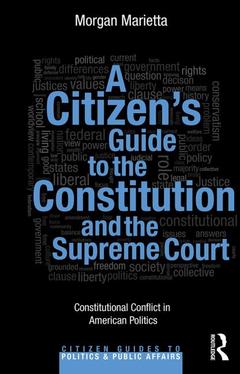Description
A Citizen's Guide to the Constitution and the Supreme Court
Constitutional Conflict in American Politics
Citizen Guides to Politics and Public Affairs Series
Author: Marietta Morgan
Language: English
Subjects for A Citizen's Guide to the Constitution and the Supreme Court:
Keywords
constitutional law; judicial review; Citizens Of The United States; textualism; Contemporary Society; common law; Violate; originalism; Common Law Constitutionalism; living constitutionalism; Expansive Judicial Review; landmark cases; Fourteenth Amendment; Supreme Court; Bill of Rights; Common Law Thinker; National Charter; Dim; Ninth Amendment; Pure Liberty; Conferred; Declaration Of Independence; Common Law Approach; Founding Era; Interstate Commerce Clause; Due Process Clause; Common Law Perspective; Follow; Bong Hits; Full Legal Person; Common Law Standard; Eighth Amendment
Publication date: 08-2013
Support: Print on demand
Publication date: 08-2013
Support: Print on demand
Description
/li>Contents
/li>Biography
/li>
The U.S. Constitution is a blueprint for a free society as well as a source of enduring conflict over how that society must be governed. The competing ways of reading our founding document shape the decisions of the Supreme Court, which acts as the final voice on constitutional questions. This breezy, concise guide explains the central conflicts that frame our constitutional controversies, written in clear non-academic language to serve as a resource for engaged citizens, both inside and outside of an academic setting.
After covering the main points of conflict in constitutional law, Marietta gives readers an overview of the perspectives from the leading schools of constititional interpretation--textualism, common law constitutionalism, originalism, and living constitutionalism. He then walks through the points of conflict and competing schools of thought in the context of several landmark cases and ends with advice to readers on how to interpret constitutional issues ourselves.
Introduction: The Constitution and Bong Hits for Jesus; 1. The Core Disagreement: How Should We Read the Constitution?; Part I: Points of Conflict. 2. Judicial Review: Is it Legitimate and Expansive, or Questionable and Limited?; 3. Rights: Are They Individual or Collective?; 4. Federalism: Must We Have One National Standard?; 5. Liberty: Does the Constitution Invoke Ordered Liberty or Pure Liberty?; 6. Religion: Is the Constitution a Religious or Secular Document?; 7. Transcendence: Do Transcendent Principles Exist in the Constitution?; 8. Social Facts: Should the Court Move Ahead of Society or Wait for Social Change?; 9. Precedent: Should We Follow or Break From the History of the Court?; 10. Completeness: What Else Do We Need to Read?; Part II: Schools of Interpretation. 11. Textualism; 12. Common Law Constitutionalism; 13. Originalism; 14. Living Constitutionalism; 15. Comparing Schools of Interpretation; 16. Points of Conflict & Schools of Thought in a Landmark Case: Roe v. Wade; 17. Contemporary Landmark Cases: From Phelps to Obamacare; Conclusion: Reading the Constitution for Ourselves.
Morgan Marietta




